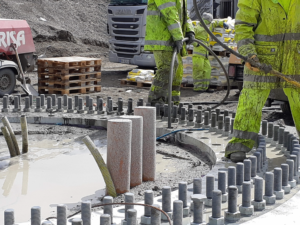Why Williams Anchors Are the Leading Selection for Reliable Foundation Solutions
Why Williams Anchors Are the Leading Selection for Reliable Foundation Solutions
Blog Article
Cutting-edge Rock Anchors for Improved Construction Assistance
Innovative rock anchors have progressively come to be a focal point in building design, specifically as projects demand higher security and efficiency. As we think about the ramifications of clever sensors and sustainable practices, one must ask: exactly how will these advancements redefine the future of building and construction assistance?
Evolution of Rock Anchors
The advancement of rock anchors has significantly changed construction methods over the past century. As engineering techniques progressed, so did the understanding of geological conditions and the need for reliable securing systems.
In tandem with improvements in materials scientific research, the advancement of grouting methods improved the bond between the anchor and bordering rock, causing increased security and longevity. The combination of technology right into style and testing procedures has resulted in extra specific and reliable installment techniques, additionally enhancing efficiency. Computer system modeling and simulations currently permit engineers to forecast anchor actions under various problems, enhancing safety and security and dependability.
Additionally, the growing focus on sustainability within building techniques has brought about advancements in environment-friendly materials and methods for rock anchoring. Overall, the journey of rock supports reflects the building and construction market's adjustment to both technological improvements and the raising complexity of contemporary design challenges.

Types of Modern Rock Anchors
Modern rock supports been available in a variety of types, each designed to satisfy specific engineering needs and geological conditions. One of the most common types consist of grouted anchors, which include putting a steel ligament right into a pierced opening and filling up the room with grout to develop a solid bond with the surrounding rock - Williams Anchors. These supports are frequently made use of in applications requiring high tons abilities
An additional widely made use of type is the mechanical anchor, which depends on mechanical devices to secure the support in area without the demand for grouting. These supports are favored in scenarios where instant load-bearing ability is necessary.
Furthermore, there are post-tensioned anchors, which are mounted tensioned to provide security to frameworks such as bridges and keeping wall surfaces. These anchors help to counteract tensile forces acting upon the framework.
Benefits of Innovative Styles
Technology in rock support design brings numerous advantages that enhance building performance and architectural honesty. Modern layouts make use of innovative products and design strategies to significantly improve load-bearing capabilities. These innovative anchors are typically built from high-strength steel or composite materials, which not only decrease weight but also enhance resistance to corrosion, ensuring longevity and integrity in numerous ecological problems.
Moreover, the use of computer-aided design (CAD) and limited component analysis (FEA) enables for accurate modeling and testing of support efficiency under real-world conditions. This results in supports that can be customized to details job demands, optimizing their effectiveness and reducing the demand for over-engineering, which can be both set you back and resource-intensive.

Study in Construction
Real-world applications of ingenious rock anchor designs show their transformative impact on building jobs. The supports were tactically positioned to enhance tons circulation and minimize settlement, inevitably leading to a much more resistant foundation.
One more substantial instance can be found in the growth of a transport passage. Innovative rock anchors were used to protect the passage wall surfaces, permitting deeper excavation without jeopardizing safety and security. The implementation of grouted rock anchors provided boosted tensile toughness, enabling workers to advance the job without hold-ups.
In a 3rd instance, a significant dam task incorporated rock anchors to maintain the embankment. Using corrosion-resistant materials in the anchors made sure lasting sturdiness, minimizing upkeep expenses and improving security criteria.
These study show the performance of cutting-edge rock support styles in attending to complicated engineering difficulties, highlighting their vital function in modern construction practices. The successful end results highlight the demand for ongoing investment in advanced anchoring technologies to fulfill advancing building and construction demands.
Future Trends in Rock Anchoring
As building demands advance, the future of rock anchoring is positioned for considerable improvements that will enhance safety and security and effectiveness in different applications look here - Williams Anchors. Emerging modern technologies, such as wise sensors and real-time tracking systems, are expected to play an essential role in the growth of more reliable securing options. These developments will certainly permit for constant assessment of support performance, making it possible for prompt interventions and decreasing dangers connected with architectural integrity
Additionally, the combination of lasting materials and methods is becoming progressively vital in the construction sector. Future rock supports may integrate environmentally friendly products that lower environmental effect while keeping performance requirements. In addition, developments in products scientific research could result in the advancement of high-strength, light-weight supports that improve installation processes and decrease labor expenses.

Conclusion
In conclusion, ingenious rock anchors represent a considerable improvement in building and construction assistance, resolving the challenges posed by diverse geological conditions. The development of contemporary layouts, including grouted and post-tensioned supports, improves load-bearing capacities while promoting security. Combination of advanced modern technologies, such as computer-aided design and clever sensors, further enhances efficiency and sustainability. Proceeded study and application of these technologies will most certainly shape the future of building techniques, guaranteeing efficiency and ecological responsibility.
Report this page